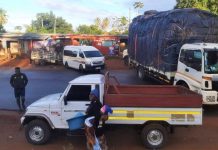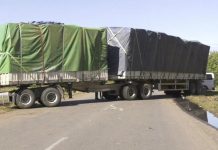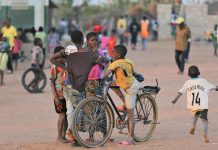Africa-Press – Mozambique. At 11:00 a.m., Faque Mário receives rice and beans from humanitarian agencies at the Coqueiros school in Chiúre. It is his first food in days after fleeing with his mother from attacks by extremists in southern Cabo Delgado, Mozambique.
“I’m going to give it to my mum, she’s sick. She’ll be very grateful because she’s suffering,” Faque, 20, tells Lusa. After the attack on the village on Thursday, it took him a day to reach the district headquarters from Chiúre Velho, helping his mother and others along the way.
The Coqueiros Primary School (EPC) in the Namissir neighbourhood of Chiúre received a 25-kilogramme bag of rice, another 10-kilogramme bag of beans and two litres of oil, which the World Food Programme (WFP) began distributing to each displaced family there, upon mandatory registration, in queues that formed at various points in the playground, amid the children’s games, guided by members from the various United Nations agencies that began to arrive at the site during the morning.
In Chíure alone, the wave of displaced people that has been growing since Thursday has reached, according to estimates on the ground, 3,500 families, and relatives and local authorities host them mainly in two temporary centres in two schools in the village, which are on holiday this week.
While carrying rice and beans on his head, which will also feed his siblings who have already arrived in the village, Faque Mário calculates his future: “With this situation, we will hold out for a month, two months.”
Attackers associated with the extremist group Islamic State claimed responsibility for an attack on Thursday on the police station in Chiúre Velho, in the south of Cabo Delgado province, with automatic weapons, taking material from inside.
The Islamic State (IS) propaganda channels broadcast the claim and provide a video that shows the rebels, allegedly belonging to the Ahlu-Sunnah wal Jama`a (ASWJ) group, firing bursts of machine-gun fire and entering the police station, saying they have taken material after burning a vehicle and “freeing Muslim prisoners”, at least one person was beheaded in the centre of the town.
In Chiúre Velho, like all his neighbours, Faque Mário left everything he had, especially the cassava, beans and peas from the fields, which are currently the main target of the terrorists, who link the attacks to the looting of the population’s property.
“I left all my food in the bush, I sleep here on the ground, behind the mango tree,” he says, before continuing his journey, laden with food for a few weeks.
Pascoal Francisco, 25, who has been sheltering in the school since Thursday with ten family members, including his three children, mother, parents-in-law and grandfather, tells the same story: “This will last us through the week. Maybe two weeks, it will be a lot.”
They all left on foot through the forest after the attack on Chiúre Velho, with only the clothes on their backs, for the second time in just over a year, as in the terrorist raid in March 2024.
“I left the food on the farm, and we came here. We received this rice to eat,” he says, recalling the day of the last attack: “They came in suddenly, and we came with nothing. All our wealth is in the farm.”
Returning home is in the plans, but for a later time: “I’m still uncertain.
If those thieves have returned to their homes, we will leave.”
Officially, agencies on the ground have so far counted more than 34,000 new displaced persons between 20 and 25 July alone, due to new insurgent attacks in the districts of Chiúre, Ancuabe and Muidumbe.
With three trucks loaded with humanitarian aid parked in the school playground since 9:30 a.m. local time (8:30 a.m. in Lisbon), workers from humanitarian agencies, including the WFP, the International Organisation for Migration (IOM) and UNICEF, are moving around the area, where an estimated 1,900 families are now gathered, organising the distribution, while volunteers gather the children in circles, singing and playing, trying to pass the time.
Each family receives tarpaulins, a kitchen kit, a mosquito net and a blanket from the IOM, and buckets, soap bars, capulanas, trousers and bandages from UNICEF.
Next door, in rooms that once housed pupils and teachers, health professionals treat mothers and new-borns, some of whom had gone without medical care for weeks. At the age of 60, Carlos Mendes took to the road for the second time, on foot, with his wife and children, fleeing day and night from the village of Natuco to Chiúre, where he arrived two days ago.
Today, he finally received food and other support for his family.
“I received these buckets with rice and mats, thank you very much,” he repeated, pointing to the children waiting to eat in his makeshift tent in the playground.
“I expect it to arrive in about a week. I am very grateful, because we left peas, cassava, corn (…) there [in the village]. I am unsure whether [the terrorists who attacked us] ate the corn, because many thieves operate there,” he said, adding: “I will return, what else can I do? I have banana trees, my farm, cashew trees, and sugar cane.”
Despite the suffering, he feels relieved that everyone remained safe in the attack and during the walk, like so many other families who did the same.
“Last year we all fled here, but we returned home. This is the second time,” he says, before returning to his family with the good news about the food.
For More News And Analysis About Mozambique Follow Africa-Press






